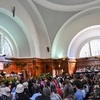Schooling high school learners in coding, robotics
23 August 2019 | Story Supplied. Photo CodeSpace. Read time 4 min.
A winter school holiday coding and robotics camp for high school learners proved so successful that the University of Cape Town’s (UCT) School of Information Technology (IT), together with software training institute CodeSpace, will run two more in December.
The initial one-week intensive programme, dubbed #RoboCampCT, attracted 65 grade 10 and 11 learners keen to boost their technology skills and prepare themselves for more advanced coding courses, including web development and robotics.
“These camps are a fantastic opportunity for us, as the School of IT, to expose more learners to coding in light of the key challenge that many schools do not have the infrastructure to create coding classes and make it part of the core curriculum,” said Professor Ulrike Rivett, School of IT director.
“So, availing our labs during the university holidays is a good use of our facilities, but even more, it allows learners to come to our campus and get inspiration about what is possible.”
A key aim of #RoboCampCT was to provide an environment which gave learners the time and space to consider why they may want to learn to code. They also learned how to use “design thinking”, a methodology used to tackle complex problems, to come up with solutions to real-world issues.
World of tech
Emma Dicks, co-founder of CodeSpace, said the UCT campus provided an ideal location for the courses, and that the team of facilitators was joined by professionals from influential industries around the country. Their insights into opportunities awaiting learners in the world of tech were extremely helpful.
Tech experts from various professions shared information on how they use technology and coding in their careers, from 3D printing and graphic design to medicine and finance.
“We were excited to see the impressive level of learning and engagement that took place,” said Dicks.
“We learnt valuable skills we didn’t even know existed, and the experience provided us all with good insight into potential careers in the realm of technology.”
The robotics, which is tactile and visual, especially intrigued the learners. They learned how writing a piece of code makes it possible to move an actual 3D object, allowing their robots to “come to life” and move around the room.
This came later in a programme aimed at seeing learners grasp the basics of the new language of technology. They can begin to code in any programming language and once they understand the basics can transfer that knowledge to the specific use of programming robotics.
Rivett said this is a crucial skill for future professionals, allowing them to use technology to enhance whatever job they are doing.
Learners came from across the Western Cape, including cohorts from organisations such as the Allan Gray Orbis Foundation, which offers a high school scholarship programme.
Learner Luqmaan Ryklief described the experience as fun and engaging.
“We learnt valuable skills we didn’t even know existed, and the experience provided us all with good insight into potential careers in the realm of technology,” he said.
- The next two camps will run from 9 to 14 December, and from 16 to 21 December. Sign up for the camps.
 This work is licensed under a Creative Commons Attribution-NoDerivatives 4.0 International License.
This work is licensed under a Creative Commons Attribution-NoDerivatives 4.0 International License.
Please view the republishing articles page for more information.




























































































































































































































































































































































































































































